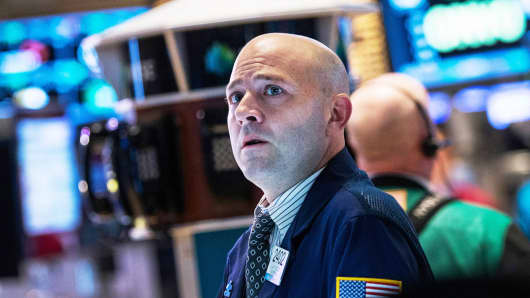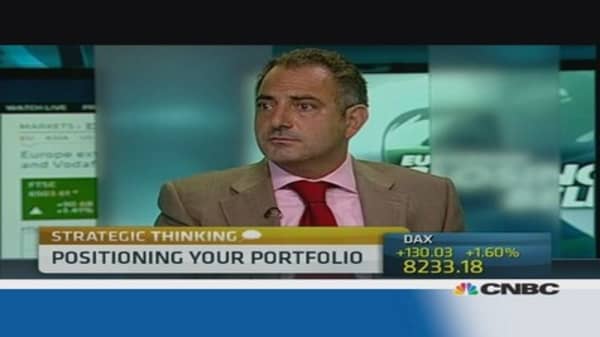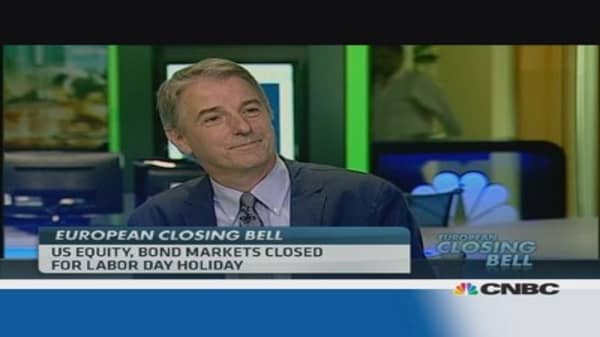Nuveen's Doll said Syria, the lack of clarity on the Fed's plans for tapering back its $85 billion bond purchase program, and uncertainty over whether its former Treasury Secretary Larry Summers or Fed Vice Chair Janet Yellen to replace Fed Chairman Ben Bernanke in January are among the issues weighing on markets. "It's the collection of these uncertainties and the absence of revenues and earnings that puts us in this funk," he said, adding selling could continue in September. "But I don't see big downside."
"I've been calling for a 1,550 to 1,700 trading range (on the S&P), and I'm still of that view that that's going to continue," said Doll. "I think we're in this sideways chopping, consolidating, boring period for a while."
Economists expect to see 180,000 nonfarm payrolls were added in August, and the unemployment rate unchanged at 7.4 percent, according to Thomson Reuters. There were 162,000 jobs added in July. the August jobs report is expected to be the last big number the Fed will use to makes its decision on whether to slow down its bond buying, or quantitative easing.
The Fed is expected by many economists to announce plans to reduce bond purchases if the number is strong, or mostly in line number with expectations. Economists vary with the amount of wind down they expect, which most seeing a $10 billion to $25 billion reduction in bond purchases when the Fed starts to taper.
"If the number disappoints then the guessing game will remain alive and well until the Fed meets in the middle of the month," said Janney's Luschini.
(Read more: Syria and the 'unknown unknowns')
Bond yields have been moving higher ahead of the Fed's September meeting, and just as there is disagreement in the market about when the Fed will taper, there's a range of opinions on how much it will reduce its bond purchases. Fed officials have said they would like to begin cutting back on purchases before year end and complete bond buying by the middle of next year.
Unintended Consequences
"The Fed hasn't stopped purchasing a single bond but the writing is on the wall and where U.S. yields have picked up and we're still looking at currency in terms of the U.S. dollar that is strengthening some," said Steven Wieting, global chief strategist at Citi Private Bank.
While not all emerging markets are getting slammed, some like India and Brazil have been feeling the effects.
"This is about the consequences of a very profound U.S. monetary easing cycle and then a decade of really great fundamentals in EM," said Wieting. "...The clearest case was the commodity exporters that benefited from China's development and oil ratcheting higher in oil prices. It improved a lot of fundamentals and simply not seeing all that repeat again means we ran out of the fundamental driver of improvement in some of these EM countries."
Hartnett said the damage to the emerging markets is not so great it would stay the Fed's hand.
"EM and Syria are an argument people are putting forward for a token taper, which I think would be real nonsense. It's really a game day decision and the payroll number will be the decisive factor between now and then," Bank of America's Hartnett said.
G-20 leaders gather later this week in St. Petersburg and certainly the global economy will be a topic. Syria will also be in the spotlight, as Russia has been outspoken against the U.S. and relations between its leadership and the U.S. have been rocky.
Later in the month, the German election Sept. 22 has been getting a lot of focus in the foreign exchange market even though a coalition backing Chancellor Angela Merkel is expected to win. Analysts say the concern is not so much whether Merkel wins but how issues will be dealt with that have been delayed until after the election—Greece being one of them.
This past weekend, a debate between Merkel and her opponent, Peers Steinbruck, was seen as a draw, but some analysts note that in fact Steinbruck may have gained some ground and now the process to form a coalition could be more complicated.
"In effect however, we expect a decent sized boost for Steinbruck as a result; expectations for his performance had been low, and the fact that he held his own against Merkel is a win of sorts in itself," according to a note from J.P. Morgan analysts.
"We think that Steinbruck has done enough to significantly reduce Merkel's chances of reprising the current Government; but not enough to put him in a strong position to replace it," they noted.
Investors are also watching Japan, where Prime Minister Shinzo Abe has promised to decide in September on whether to raise the consumption tax by 3 points to 8 percent, which could slow the economy.
—By CNBC's Patti Domm. Follow here on Twitter @pattidomm.
Correction:
This story has been updated to reflect the correct name of data provider Thomson Reuters.






